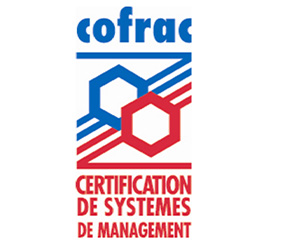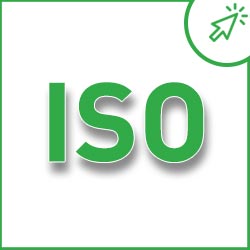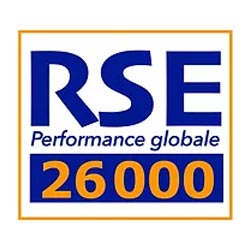Your challenges
of Management Systems certification


In this respect, undertaking a management system certification process is a powerful lever for reinforcing the organizational efficiency of your structure, optimizing your processes, controlling risks and reinforcing the legitimacy of your organization in the eyes of the various stakeholders.
Apave's solutions
Whatever your objective or sector of activity, Apave can audit your organization's various management systems.
The management system is a set of principles, rules and procedures that enable an organization to manage its activities effectively and efficiently. This system is composed of several elements, including the organization's objectives, policies, procedures, instructions and control measures.
In addition to providing companies with a solid and transparent policy thanks to standards established by world-renowned experts, a management system is a guarantee of performance, time savings and productivity, as well as a gateway to the international market.
This service is performed under COFRAC accreditation (according to ISO 17021-1) for the certification of management systems.
 |
ISO 9001 - 14001 - 45001 - 50001 : Accreditation n° 4-0552 - scope available on the website www.cofrac.fr |
We can work on both voluntary and mandatory regulatory certifications.

ISO 9001

ISO 9001
What is Quality Management?
Improving customer satisfaction with a quality management systemISO 9001 is an international standard for implementing a quality management system in companies and organizations of all sizes, and in all sectors of activity, with the aim of improving customer satisfaction.
Increasing your performance and competitiveness, satisfying your customers, involving your employees, committing to a long-term quality approach: these are the main benefits of the ISO 9001 standard for which Apave Tunisie certifies you.
The requirements
- Management involvement
- Customer focus
- Staff involvement
- Process approach
- System approach
- Continuous improvement approach
- Fact-based decision-making
- Mutually beneficial relationships with suppliers
Target
ISO 9001 certification is aimed at any public or private organization, whatever its size or sector of activity.Key features
- Internal audits: the standard's requirements call for the organization to audit its own quality system. This work enables the relevance and, above all, the efficiency of processes to be verified.
- Involving customers in quality management: the direct involvement of customers in improving quality policy is a strong argument in favor of enhancing customer satisfaction.
- Independent assessment: certification by an independent body such as Apave Certification is a real guarantee of quality and credibility.
Periodicity
ISO 9001 certification is valid for 3 years. Certification renewal requires a renewal audit, carried out by a different auditor.How to obtain certification:
Resulting from a voluntary approach, 9001 certification requires that your quality management system has been in existence for 6 months, that it has been audited internally at least once, and that a management review has been carried out.
The benefits of ISO 9001: Quality management
- Increased customer confidence in meeting their needs and expectations
- Cost reduction
- Staff involvement and motivation
- Progress through a continuous improvement process
- Removal of trade barriers
- International recognition

ISO 14001

ISO 14001
What is it?
ISO 14001 is a voluntary international standard for implementing an Environmental Management System in companies and organisations of all sizes and in all sectors of activity. Putting the environment at the heart of your action and being able to prove your impact and its evolution is the challenge of implementing an environmental management system.
The requirements
- Determine your environmental impact
- Develop an environmental policy
- Establish objectives
- Take into account regulatory requirements
- Establish processes that respect the commitments expressed
- Take the necessary actions to improve environmental performance
Target
ISO 14001 certification is aimed at any public or private organisation, whatever its size or sector of activity, wishing to control and reduce its environmental impact.
The characteristics
- The requirements of an EMS are divided into 18 environmental requirements and 6 chapters, including:
- General requirements
- Environmental policy
- Planning
- Implementation of actions to meet the environmental policy
- Controls and corrective actions
- Management review
Periodicity
The ISO 14001 : Environmental Management System certification is valid for 3 years, subject to the completion of annual surveillance audits.
Renewal of the certification requires a renewal audit, which is performed by a different auditor.
Benefits of ISO 14001: Environmental Management
- Identify the environmental aspects of your activities, products and services
- Implement a real environmental policy
- Control the environmental impact of your activities by reducing nuisance
- Compliance with regulatory requirements
- Transparent communication with staff, local residents, customers, environmental associations, elected representatives, insurers, etc.
- Enhancement of your image
- Opening up to new markets by proving your involvement in the preservation and protection of the environment on a global scale

ISO 19443

ISO 19443
What is it?
ISO 19443 is an international industry standard designed to enhance safety and control quality throughout the nuclear supply chain. It is specifically aimed at suppliers and/or subcontractors of products and/or services important to nuclear safety (IPNS).
ISO 19443 is an adaptation of the international ISO 9001:2015 Quality Management System (QMS) standard, tailored to the specific requirements of the nuclear sector.
The requirements
- Management involvement
- Customer orientation,
- Staff involvement
- Process approach
- System approach
- Continuous improvement
- Fact-based decision-making
- Mutually beneficial relationships with suppliers.
Target
ISO 19443 is an international standard designed to enhance safety and control quality throughout the nuclear supply chain. It is specifically aimed at suppliers and/or subcontractors of products and/or services important to nuclear safety (IPNS).
Periodicity
ISO 19443: Nuclear Quality Management System certification is valid for 3 years, subject to annual surveillance audits.
Renewal of certification requires a renewal audit, carried out by a different auditor to confirm that there are no major non-conformities with the requirements of ISO 19443. You can also have the renewal audit carried out by another certification body.
Benefits of ISO 19443: Nuclear Quality
- Supply nuclear products or services that are compliant, ethically safe, competent and meet quality requirements.
- Establish a culture of best practice and continuous improvement
- Place safety, security and reliability at the heart of company processes
- Maintain compliance with legal requirements
- ISO 19443 certification contributes to the implementation of a continuous improvement process that will control and reduce malfunctions in your business, and increase the effectiveness and efficiency of your organization. Compliance with the necessary regulatory requirements is assessed.

ISO 22000

ISO 22000
ISO 22000 is an international standard that defines the requirements for an effective food safety management system. It applies to all links in the food chain, from primary producers to manufacturers of finished products.
Services
Apave controls food safety risks throughout the entire food supply chain, thanks to its experts from the farming and agri-food sectors, through interviews with the parties concerned, on-site examinations and internal audits of your company.
You will then receive a certification audit report with a corrective action plan to comply with ISO 22000 standards.
Target
All agricultural producers of plant or animal products, packaging, storage, distribution and catering organizations, public or professional.
Periodicity
ISO 22000 certification is valid for 3 years, with one renewal audit and two annual surveillance audits.
Benefits
Proves to your customers and employees that your organization has a management system that covers the safety of your foodstuffs.

ISO 27001

ISO 27001
ISO/IEC 27001 is an international standard that describes the requirements for implementing an information security management system (ISMS). It provides a structured approach for setting up, implementing, evaluating, maintaining and improving an ISMS.
Objective
- This certification meets the requirements of organizations in terms of data protection and compliance with certain corporate regulations (RGPD ...).
- Optimize your information systems security management system.
- Implement security practices.
Target
Companies with sensitive data (General Management, Quality Manager, CISO (Information Systems Security Manager)).
Periodicity
Certification is valid for three years, with annual surveillance audits.

ISO 45001

ISO 45001
What is it?
ISO 45001 is the first international standard for occupational health and safety management systems (OHSMS). ISO 45001 provides organizations with a structured approach to improving the health and safety of their workers, preventing occupational accidents and illnesses, and reducing the risk of exposure to occupational risk factors.The benefits
- The ISO 45001 standard certifies that your company has a quality, safety and environment (QSE) policy that complies with legal requirements and preventive measures on occupational
- health and safety management.
- A high-level structure (HLS) based on standards, facilitating the transition to ISO 45001 and guaranteeing a continuous improvement approach.
- Adaptable to all company structures, whatever their size, activity or degree of mastery of OHS-related issues.
- One of the most sought-after ISO standards worldwide, it is the first to take occupational health and safety into account.
- Reduced number of workplace accidents.
- A better image with your employees
Objectives
- Reduce and structure risks through global management.
- Reduce work-related accidents
- Optimize your company's costs (insurance premiums, optimal activity, etc.) and productivity (absenteeism rate, staff turnover, etc.).
The differences between ISO 45001 and OHSAS 18001
- Unlike ISO 18001, which focuses on hazard management, ISO 45001 is based on the relationship between the organization and its business environment.
- Whereas OHSAS 18001 is based on company procedures, ISO 45001 takes a business process approach.
- Like OHSAS 18001, ISO 45001 also takes account of OHS risks and opportunities.
- ISO 45001, unlike OHSAS 18001, incorporates stakeholders or interested parties.
- However, an OHSAS 18001-certified system will find it easier to migrate to ISO 45001.
Target
Construction, production and service companies in all sectors. (manager, QSE manager, OHS manager, maintenance manager, human resources manager).Periodicity
ISO 45001 certification is valid for 3 years, subject to audits.Thereafter, a renewal audit by a different auditor is required to validate compliance with the standard's requirements and renew the certificate.

ISO 50001

ISO 50001
Objectives
- Continuously improve energy performance through a better energy policy
- Reduce energy-related costs
- Reduce greenhouse gas emissions
- Meet CSR policy commitments through objectives and action plans.
Target
Energy producers, energy-consuming companies, public or semi-public bodies (energy management: boiler rooms), social landlords (management of building stock), site managers for smaller structures.Periodicity
ISO 50001 certification is valid for 3 years, subject to audits.Thereafter, a renewal audit by a different auditor is required to validate compliance with the standard's requirements and renew the certificate.

ISO 3834

ISO 3834
What is certification?
Certification of your quality system to ISO 3834 contributes to your company's success by boosting customer satisfaction and employee motivation.
The standard covers the following areas:
- Quality: non-conformities and corrective actions, traceability
- Review of requirements, technical review and subcontracting
- Workshop organization and process management
- Staff skills
- Inspection and calibration
Requirements
Depending on the criticality of the products manufactured (usage), the complexity of manufacturing, the product range or the customer's specifications, the company chooses from the following standards:
- ISO 3834-2: Full Quality requirements
- ISO 3834-3: Standard Quality requirements
- ISO 3834-4: Elementary Quality requirements
Target
Groups specializing in subcontracting work, small and medium-sized businesses and very small firms carrying out construction or mechanically-welded assembly work.
Characteristics
If we were to group together the main features of this quality standard, the following triptych would emerge:
- Internal audits: the standard's requirements call for the organization to audit its own quality system. This work enables the relevance and, above all, the efficiency of processes to be verified.
- Involving customers in quality management: the direct involvement of customers in improving quality policy is a strong argument in favor of enhancing customer satisfaction.
- Independent assessment: certification by an independent body such as Apave Certification is a real guarantee of quality and credibility.
Periodicity
Certificate validity: 3 years.
Benefits of ISO 3834: Welding management
- Increased customer confidence
- Cost reduction
- Staff involvement
- Progress-oriented approach
- Removal of trade barriers
- International recognition

EN 9100

EN 9100
What is it?
The EN 9100 standard is specific to the Aerospace & Defense (ASD) sector. The EN 91X0 series of standards (EN9100 / EN9110 / EN9120) are designed to establish a quality assurance system for the aerospace and defense industries.
EN 9110 applies to maintenance and repair activities, while EN 9120 applies to the storage and sale of new or repaired equipment.
The requirements
EN 9100 includes the Quality Management System (QMS) requirements developed in ISO 9001:2015, and specifies requirements, definitions and additional notes directly related to the Aerospace and Defense industries.
To enable all players in the global ASD industry to check the quality of their suppliers' services against the audited standards (EN 9100 in Europe, AS 9100 in America and JISQ 9100 in Asia), the IAQG (International Aerospace Quality Group) has set up OASIS (Online Aerospace Supplier Information System).
OASIS is a supplier information database which lists all organizations certified to the EN91X0 series of standards.
Target
Companies operating in the aerospace and defense sector (senior management, quality managers).
Key features
EN 9100 certification enables specialized companies to plan, establish and implement a quality management system specific to this sector. It is aimed at improving quality in the aerospace and defense sectors.
EN 9100 applies to all areas of the supply chain, addressing activities in :
- Design
- Development
- Manufacture of equipment, aeronautical accessories and spare parts,
- Procurement
- Airline companies
- Engine manufacturers
- Aircraft manufacturers...
- It is designed to adapt to all organizations, whatever their size, taking into account their environment and the complexity of their operations.
Periodicity
EN 9100 certification - Quality Management System in Aerospace and Defense - is valid for 3 years, subject to completion of annual surveillance audits and satisfactory results.
Renewal of certification requires a renewal audit, which confirms that EN 9100 requirements have been met.
Benefits of EN 9100: Aeronautical Quality
- Improve relations with customers and meet their challenges
- Be listed in the “OASIS” supplier database
- Contribute to the overall quality of the supply chain
- Optimize your organization
- Secure production activities
- Enhance your image
- Demonstrate your commitment to quality
Label
Labels attest the quality of a product or service. Labels can be voluntary or mandatory, and are issued by independent organizations. Labels allow consumers to make informed choices based on objective criteria.
Need a label for your product, but don't know where to start? Don't worry, we'll walk you through it step by step. The first thing to do is to determine the type of label you need. Apave provides you with existing and customized labels for your private organization, guaranteeing the quality and conformity of a product/service.
Benefits:
The labeling of your organization:
- Adds value to your production through the guarantee of the quality of your services and products.
- Distinguishes you from your competitors
- Enhances your image with your customers.
- Sometimes allows you to access new markets
- Benefit from a better visibility
Existing labels:
Several labels exist today, the best known being the Safe & Clean label which reassures your consumers since the Covid epidemic. However, other labels are created every year such as :
- HS2® : Helps elderly people to stay at home in the best conditions
- Safe & clean : Taking into account the conditions of cleanliness of a company
- RGPD commitment: Taking into account the regulation on data protection.
- Biodiversity signature: Taking into account the issues related to biodiversity
- Longtime label: Guarantees a product that is easy to repair and has a long service life.
Label RSE 26000


Apave's expertise
|
Apave in Africa boasts a network of 250 qualified and experienced auditors and 5 certifying entities. Our experts, who can be mobilized at any time throughout Africa, have multi-sector expertise (nuclear, agri-food, aerospace, etc.) and a perfect command of the normative requirements specific to the industry concerned. |
A solid territorial network in Africa

Your questions
on management system certification
-
What is a management system?A management system refers to the set of processes used by an organization to manage its activities and achieve its objectives (product or service quality, worker health and safety, operational efficiency, environmental performance, digital risk control, etc.). All management systems are designed to be improved over time, as part of a continuous improvement process.
-
When to obtain management system certificationApplication for management system certification may be voluntary, in order to optimize processes, improve performance, meet customer requirements, strengthen competitiveness in the face of emerging market competitors, etc. It may also be a regulatory requirement, in order to comply with local legislation.
Certification of management systems can be requested at any time. For certain standards, however, it is recommended to have a management system that has been in operation for more than 6 months, and which has undergone at least an internal audit and a management review. -
What are the advantages of obtaining management system certification?
A certification process enables an organization to demonstrate that its management systems comply with the requirements set out in the relevant standard. The result is an internationally recognized certificate guaranteeing the performance, efficiency and quality of management systems based on criteria of excellence.
Obtaining such certification offers multiple advantages. It enables the audited organization to:
- - Strengthen its brand image and reputation;
- - Stand out from the competition;
- - Demonstrate its performance, reliability, transparency and legitimacy through reliable, recognized indicators;
- - Optimize internal processes, increase organizational efficiency and reduce costs;
- - Gain greater visibility of malfunctions and areas for improvement;
- - Involve employees in a continuous improvement process;
- - Strengthen the confidence of customers and other stakeholders (suppliers, business partners, etc.);
- - Boost customer satisfaction and loyalty;
- - Reinforce the management and control of human, technical, environmental and digital risks.
-
How does management system certification work?Once we have received the application for certification, we schedule an audit together. Once the initial certification audit has been carried out on site, we issue a certification decision, followed by an official certificate. An annual follow-up audit is then carried out to ensure ongoing compliance with the criteria imposed by the standard.
-
How long is a management system certification valid?Most management system certifications are valid for 3 years, from the date of a positive initial audit result. During this period, two surveillance audits must be carried out to validate continued certification. A renewal audit must then be carried out to renew certification.
Why
choose Apave?

COMMITMENT

EXPERTISE

PROXIMITY
Discover
our news




